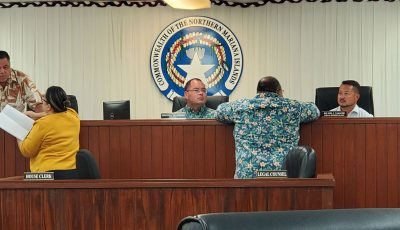House did not act on Senate resolution to approve Torres’ request for $500 bonuses for gov’t retirees
The House of Representatives has held off acting on Senate Joint Resolution 22-05 that would have given CNMI government retirees $500 bonuses this holiday season.
For now, House Speaker Edmund S. Villagomez (Ind-Saipan) would like to keep Senate Joint Resolution 22-05 on the agenda for further review.
Villagomez made the decision after vice speaker Blas Jonathan T. Attao (R-Saipan) raised some issues about the resolution in yesterday’s session and underscored the need for more information from the Department of Finance and the administration.
Last week, nine senators unanimously approved SJR 22-05 that approved Torres’ request to reprogram $1.3 million from the general fund for the payment of the retirees’ $500 bonuses.
Senate President Jude U. Hofschneider, who authored the resolution, said they agreed with the importance of expeditiously entertaining Torres’ request in support of the retirees.
Attao extended appreciation to the Senate for acting on this legislation, but pointed out that any distribution of funds should begin in the House and failure to do that on anything that has to do with revenues that’s moving from the Senate is deemed illegal under the CNMI Constitution.
“It’s the authority of the House to move those funds,” Attao said.
In addition, he said that Torres’ letter to Villagomez and Hofschneider had reflected that specific accounts be utilized, which is the discretionary account for the governor, lieutenant governor and other accounts within the Department of Finance shall be reprogrammed.
“Unfortunately, those documents were not provided to us,” he said.
Attao said the governor’s letter says that they will be supplanting or backfilling the accounts through the American Rescue Plan Act funds.
He said they all know that under ARPA, they cannot use any of the funds to address pensions, which in this case is being viewed as $500 bonus to the pensions that the retirees are receiving. “This body is not against assisting the retirees. It’s been very clear that this body has introduced multiple legislations in support of our retirees,” Attao said.
He said in the governor’s request, they don’t know which programs or activities are affected in fiscal year 2022 enacted budget, or whose funding levels will be reduced to the level of $1.3 million.
In addition, Attao said, they do not know the fund status of these accounts as of the date of the governor’s letter.
He said alternatively, Torres offered to use appropriate discretionary funds of the governor and the lieutenant governor, as well as funding sources from the Department of Finance.
Attao said the governor did not provide financial information to determine the amount of money available and the discretionary fund, as well as the funding sources of the Department of Finance.
He said to make the important decision of whether or not the general fund has the ability to pay the $1.3 million on bonuses for retirees, he is requesting that they obtain some financial information to make their assessment and decision making easier.
Attao listed four final information that they need to obtain from the administration.
Rep. Christina E. Sablan (D-Saipan) said Attao did an excellent job.
Sablan said unfortunately, her impression is that the governor made this promise to the retirees for the $500 bonus but without actually checking to make sure that the funds were available in the first place.
“And we know that ARPA comes with many restrictions,” she said.



























